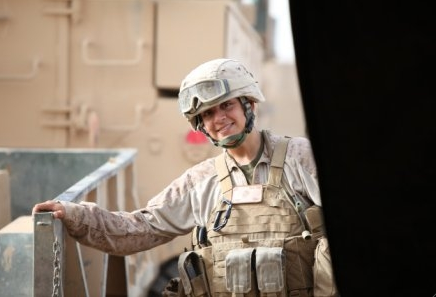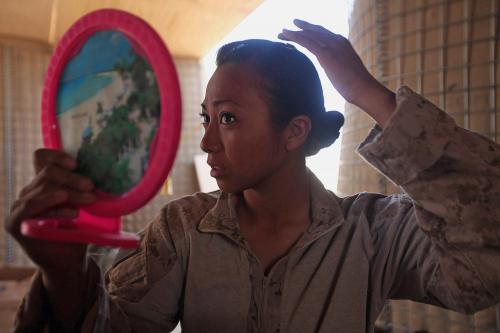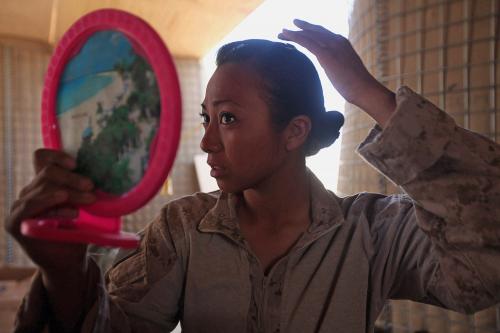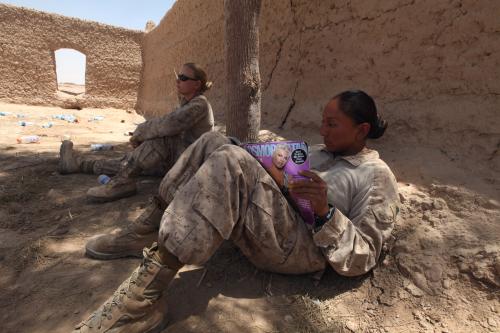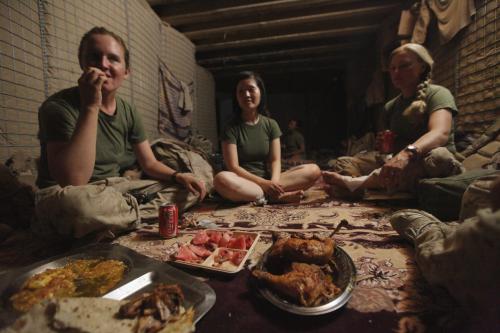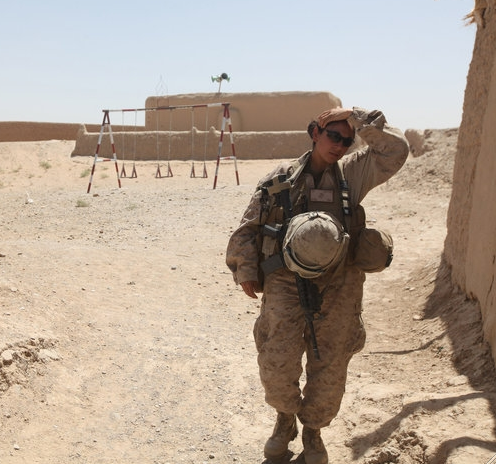Marines first, ladies always (Part II of II)
SLANTED: With that picture - our female staff members (this issue was edited solely by them, me being the exception) liked it especially and besides finding it cute (I thought almost "too cute") I had the feeling they were telling me that this picture ... represented to them the superiority in civilisation that women come with naturally, ... would you agree?
I love that they see that in the photo. I'm split on this. On one hand I firmly believe that our progress in Afghanistan would not be going as well if we did not have the female engagement team. On the other hand, this is a male-dominated organization and will always remain that way. Women are not physically capable of enduring the physical stress put on the body. But at the same time, we put ourselves in those situations where we come out bruised, swollen and bleeding at times.
(OK, male-question from me) Why would it matter in the sticks in Afghanistan how her hair lies or falls - who to?
Female Marines are negatively stereotyped as being masculine, ugly and un-ladylike. It's been like that for years. If I fix my hair and look professional it'll break that stereotype. I don't want male Marines thinking that all female Marines are not ladies at all.
You often photograph male soldiers - also on assignments that are close and personal - I have not seen one with a guy doing anything more "vain" than shaving. Why?
I don't have an answer to that. I actually never realized it until now. All I can say is that I'm a female Marine in a male dominated organization and in order to dispel myths and stereotypes I have to look, act and be a lady.
One thing I forgot to mention is that no matter where in the world we are, male and women Marines must maintain grooming standards. Men will shave, cut their hair and be physically fit. Women will also maintain their grooming standards. We will be reprimanded by our superiors if we fall out of regulations.
Your pictures are very matter-of-fact photography (of course). Are these pictures retouched or "cleansed" before they get published on the server?
I do not agree with violating the integrity of a photo. Other than resizing it for uploading and brightening, I choose not to Photoshop them. I often see "artistic" photos with different filters applied. Let me tell you, there is nothing glamorous about Afghanistan. It smells terrible, there is human feces everywhere, and it's dangerous. I want the public to see that, to step inside that photo and place themselves in our shoes or boots. I feel you can't do that if I alter the image.
technical question - what lenses do you preferably use? What camera?
I use a Cannon 5D Mark II with a 28-135mm lens. I can only carry one lens because along with my still camera, I'm carrying a video camera, my rifle, extra bullets, medical pack, Kevlar and flak jacket. It's extremely heavy.
Do you photograph in your spare time?
I do not own a camera myself. When possible I'll take my work camera home and use it to photograph during my spare time. I'm currently stationed at Camp Pendleton in California. Southern California is beautiful and I'm just now getting out photographing environmental portraits and the scenery.
How did you get that job? What was your motivation?
Like many Marines, I walked into the recruiting office with only one request and desire, to become a Marine. When my recruiter sat me down and presented me with a variety of job options, I chose Public Affairs. It seemed interesting to me. A Marine who enters the Marine Corps as a legal clerk does that his whole time as a Marine. I can step inside the world of an infantryman one day and the next day I can step inside the world of an explosives technician. It's never boring.
Over the time I developed a sense of pride. I am telling their history. Maybe years from now my work will air on the History channel. Maybe the photo of Yumol will be published in history books and will inspire a young female student to break down barriers that may be keeping her from pursuing her dreams.
On a reportage like the one on the FETs - do you work alone or is there a whole team? I somehow have this feeling that you are roaming alone and rather freely - or is there a concept before hand - because on the other hand I can hardly imagine that anything in the Army or with the Marines is left to chance?
I usually work alone. In this case I took Cpl. Sindelar, my counterpart with me. We alternated between cameras. I wanted to make sure we captured everything.
When combat correspondents attach to infantry units we are automatically attached to a squad. Before we go on patrol, I tell the Marine in front of me that I'll be following him the whole time and that I'll remain behind him. I let him know my ground rules just to make him feel more comfortable. I won't walk ahead of him, I'll be careful of where I step and I'll be vigilant as well. I want him to know that I'm fully combat trained and I will react properly should anything happen.
During the FET mission I roamed around because it was safe. The male Marines provided security for us and the area was cleared beforehand.
in your job as photographer - do you feel you belong in a certain category? Do you relate to yourself as "public relation's photography" or to "war photographer"?
By definition you pictures seem to belong to both categories - but how do you see it?
This is a sore spot for me. I've been in the Marine Corps for eight years now. I've deployed twice. I've put my family on hold to do what I thought was right. I stepped up to the plate. Yet there are several Marines in my field who have yet to deploy. I call them Public Affairs Marines. I proudly call myself a combat correspondent and war photographer. I've earned that title.
Have you ever had to photograph in combat?
Sgt Heidi Agostini: All I can say is that there have been situations I've photographed. The images are branded into my heart and will never leave me. I carry the weight of the world on my shoulders and the sadness is overwhelming. Published or not, I see these images every day.
If so... when it starts, do you grab naturally your camera of your weapon?
My first instinct is to grab my camera. I feel that it's safe enough for me to do so because I'm surrounded by Marines. I take a few photographs and then drop the camera.
How often do you get interviewed? And published in media other than military?
As a combat correspondent I rarely receive interview requests. Usually I market my work and generate interview requests for my subjects. I have been published in a few books, several magazines and art galleries. I've also had several photographs and video packages aired on television for news or entertainment programs.
Marine Sergant Heidi Agostini is 29 years old, her hometown is Chicago and married to Staff Sergant Luis Agostini.
